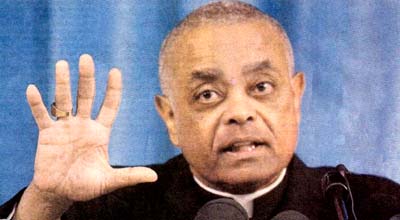 |
Pedophilia Crisis
Scapegoat
Atila Sinke Guimarães
Bird's Eye View of the News, November 15, 2002
 At the Bishops’ meeting in Washington (November 11-13, 2002), Bishop Wilton Gregory, head of the USCCB, came up with a strange argument to explain the change of tone regarding the Charter of Dallas on pedophile abuses. The new document was imposed by the Vatican, which denied its approval to the Dallas decisions.
At the Bishops’ meeting in Washington (November 11-13, 2002), Bishop Wilton Gregory, head of the USCCB, came up with a strange argument to explain the change of tone regarding the Charter of Dallas on pedophile abuses. The new document was imposed by the Vatican, which denied its approval to the Dallas decisions.
The tonus of the first document was one of contrition on the part of the Bishops for covering for 325 pedophile priests. It also asked for forgiveness and made the promise to punish the guilty in an exemplary way. The tonus of the new document is one that presents the wave of just indignation of Catholic public opinion as the fruit of a surreptitious extremist maneuver to destroy the Bishops’ power in the Church and the reputation of the good clergy. This maneuver would have been executed by various progressivist organizations whose ultimate purpose is to change the Church.

A rhetorical excuse by Bishop Gregory that tries to distract attention from the Vatican's unpopular commands - The Los Angeles Times, October 19, 2002 |
These were the words of Bishop Gregory:
“Sadly, even among the baptized, there are those at the extremes within the Church who have chosen to exploit the vulnerability of the Bishops in this moment to advance their own agendas. One cannot fail to hear in the distance – and sometimes very nearby – the call of the false prophet, ‘Let us strike the shepherd and scatter the flock.’ We Bishops need to recognize this call and to name it clearly for what it is” (Los Angeles Times, November 12, 2002).
Even if Gregory did not mention the names of such organizations, it has been generally understood from his words that they would be the progressivist groups that are calling for the abolition of priestly celibacy, the participation of lay people in the decision-making process of the Church, the ordination of women and married men, etc. (ibid).
I must say that this melodramatic rhetoric of Bishop Gregory did not convince me at all.
• First, because the crime of pedophilia is a crime that cries to Heaven for vengeance. Therefore it should produce an extraordinary indignation in a healthy public opinion. You don’t need a conspiracy theory to explain this very normal reaction of the Catholic people.
• Second, because many of the Bishops were guilty of connivance, as they acknowledged in Dallas, and thus they are quite deserving of the discredit they have earned from the faithful.
• Third, because in these scandals not only priests, but also Prelates were convicted of homosexuality or pedophilia. Archbishop Weakland acknowledged publicly his homosexuality and two Bishops in Florida were convicted of pedophilia. The three of them had to resign. If these were convicted, how many others are there who are guilty and still unrevealed? Who knows their names? Given such precedents, it is legitimate for the public to be suspicious of the Bishops.
• Fourth, the progressivist forces that Bishop Gregory implicitly mentioned as conspiring against the hierarchy of the Church are also favorable to homosexual priests. For this reason normally they would not be the first promoters of the wave of indignation. Certainly they took advantage of the scandal to further their agenda, but it seems to me quite exaggerated to say that they are responsible for the whole wave of reactions. Why should they “burn” Weakland, one of their principal supporters among American Bishops?
• Fifth, it is my personal opinion that the position taken by the American Bishops in Dallas was a good beginning, and with that they recovered a little of their credibility. On the contrary, I think that the step backwards they just took in Washington makes them look bad again. If I am correct, to whom should one attribute this diminishment of prestige? To a conspiracy or to the Bishops themselves who now have voluntarily changed their position?
I think that the main reason for the wave of reactions against the pedophile abusers should be attributed to the complacent Bishops. The conspiracy made by extreme forces pointed to by Bishop Gregory just seems to be a scapegoat to divert public attention from their change of position.

Fifty-six
Atila Sinke Guimarães
Bird's Eye View of the News, May 17, 2002
 Fifty-six percent of Catholics polled by the Pew Research Center said Church leaders have “mostly tried to cover up the problem” of sexual abuse by priests, while 32 percent said the leaders have “mostly tried to deal with it” (America, April 1, 2002). The numbers speak for themselves. If Bishops were elected by the people, as many progressivist Bishops are clamoring for, they would lose their positions.
Fifty-six percent of Catholics polled by the Pew Research Center said Church leaders have “mostly tried to cover up the problem” of sexual abuse by priests, while 32 percent said the leaders have “mostly tried to deal with it” (America, April 1, 2002). The numbers speak for themselves. If Bishops were elected by the people, as many progressivist Bishops are clamoring for, they would lose their positions.

|
Pedophilia | Hot Topics | Home | Books | CDs | Search | Contact Us | Donate

© 2002- Tradition in Action, Inc. All Rights Reserved
|
 |
|